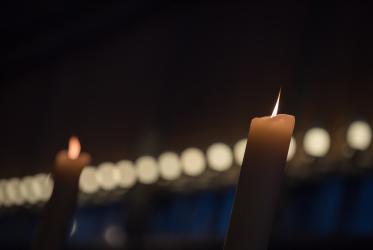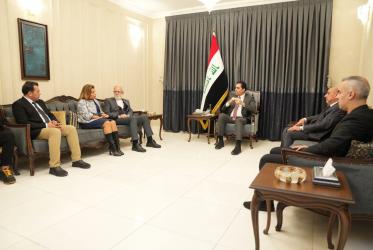Rev. Dr Emmanuel Clapsis
Holy Cross – Greek Orthodox School of Theology, Boston, USA
In an increasingly complex and violent world, Christian churches, along with other communities of living faith, have come to recognize that praying and working for peace is a primary expression of their responsibility for the life of the world. For the Christian church, peace is inextricably related to the notion of justice and freedom that God has granted to all human beings through Christ and the work of the Holy Spirit as a gift and vocation.
Peace and peacemaking as a gift and vocation provide opportunities to connect theology with ethical witness, faith with politics. In doing that, the churches cannot ignore their social context, with all its paradoxes and conflict. In the midst of injustice, oppression and occupation, the churches must find ways to communicate with people and communities of other living faiths, ideologies, cultures and beliefs and work with them to advance peace and justice.
Working together requires religious communities not to abandon their particular claims about the origins of peace and how it can be fully established in the life of the world, but to develop a theology of involvement and cooperation with other religious communities. It cannot be just an exchange of ideas and a comparing of different theologies, nor a matter of political expediency. It needs to be expressed through concrete actions and initiatives that recognize the universal presence and salvific operation of God’s grace in the entirety of creation, in history and in whole of humanity. The Third Pan-Orthodox Preconciliar Conference (1986) encourages the Orthodox churches to move towards this wider cooperation:
The local Orthodox churches in close collaboration with the peace-loving faithful of other world religions consider their duty to work for peace on earth and the establishment of fraternal relations between peoples. The Orthodox churches are called upon to contribute to joint effort and collaboration between religions, and thereby combat fanaticism anywhere; in this way work for reconciliation between peoples, the triumph of the values represented by freedom and peace in the world, service to humanity today regardless of race or religion…
Here a crucial question is raised concerning the preservation of the unique participation and presence of the church in the life of the world: At what point may the church in its involvement in movements of social change and in working with other communities of living faiths to advance justice and peace reduce itself just to another community of political change or to an apologist of the prevailing social, political, tribal ideologies—abandoning or even going against the eschatological nature of the gospel?
Refusal to act because of this justifiable fear is a betrayal of the church’s mission; what is required by the churches in such situations is the constant nourishment of their political actions by the totality of the church’s life. Here again the Third Pan-Orthodox Preconciliar Conference (1986) provides helpful insights into how the particularity of the Christian faith should guide the mission of the church in situations of injustice, violence and oppression:
We, Orthodox Christians, have—by reason of the fact that we have had access to the meaning of salvation—a duty to fight against disease, misfortune, fear; because we have had access to the experience of peace, we cannot remain indifferent to its absence from society today; because we have benefited from God’s justice, we are fighting for further justice in the world and for the elimination of all oppression; because we daily experience God’s mercy, we are fighting all fanaticism and intolerance between persons and nations; because we continually proclaim the incarnation of God and the divinization of man we defend human rights for all individuals and all peoples; because we live God’s gift of liberty, thanks to the redemptive work of Christ, we can announce more completely its universal value for all individuals and peoples; because, nourished by the body and blood of our Lord in the holy Eucharist, we experience the need to share God’s gifts with our brothers and sisters, we have a better understanding of hunger and privation and fight for their abolition; because we expect a new earth and new heaven where absolute justice will reign, we fight here and now for the rebirth and renewal of the human being and society.
Indispensable in working successfully with others is the acquisition of cooperative and conversational skills, as well as theology, that allow the churches to recognize and respect the integrity of other people’s beliefs, practices and communal life. The concern of the churches for peace and their active participation in movements of peace and social justice is a testing ground of their faith about the origins and essential goodness of the world and its future because of God’s love.
The active cooperation of religious communities with other movements of social transformation in advancing the cause of peace presupposes that they are willing to examine and assess critically their past and present performance in history. This can help free them from multiple ideologies (nationalistic, political, racial, and economic) that use the passion that religious faith evokes for the purpose of advancing their own goals, values and interests. It is not uncommon for people in violent situations and conflicts to profess faith in God’s peace and at the same time to give legitimacy to their violent acts as their contribution to God’s cause for the world.
Religious truth as it is espoused and lived in different religious communities is ambivalent in nature and in its effects. It can be a force of peace, justice, and freedom but also an instrument of injustice, violence, war and oppression. An appropriate response is not less religion in the public space or the eventual suppression of its role in the personal and communal lives of its adherents, but a conscious effort by all religious communities to give pre-eminent emphasis to those elements of their faith that promote human dignity, justice and love for all human beings. Indispensable is the theological assessment of otherness and difference in the context of their universal claims about truth, love, peace and justice. This reconfiguration of religious truth is complex, painful and highly contested and may generate violence, fragmentation and division even in the inner life of religious communities.
Religion denies itself when it is hijacked by fanaticism, a highly complex irrational psychopathological state that leads religious people and communities to surrender themselves to violence, cruelty, and inhumanity against those who do not subscribe to their beliefs or patterns of life or threaten their interests. The divine Lordship can easily take the shape of violent human domination through justified wars or repressive acts against other people and nations. Those who have studied the role of religion in violent conflicts throughout the world urge religious leaders and theologians to become more proactive in confronting the sources of violence that emanate from within their communities. There is a need for a strong, unambiguous and clear articulation of those elements of religious faith that advance peace and justice for all human beings, repudiating those coreligionists who use their faith to incite communal strife and global terror. Such a declaration must necessarily affirm the dignity and the sacredness of human life and embrace religious freedom and diversity as an indispensable social right in the modern world.
Insights for a culture of peace
The early Christians, as can be discerned by their liturgical prayers, gave primary emphasis to the eschatological peace that God grants to them as a gift of communion with Christ through the power of the Holy Sprit. They did not ignore the conflicts, power struggles and violence in the world. In the Orthodox tradition there is a strong bias for peace. St Nicholas Cabasilas says that “Christians, as disciples of Christ who made all things for peace, are to be ‘craftsmen of peace’ (τεχνίτες ειρήνης).”[1] They are also called a peaceable race (ειρηνοποιον γένος),since in the words of St Basil, “nothing is more characteristic of a Christian than to be a worker for peace”.
The Christian understanding of peace and how it is advanced in the life of the world is guided by the eschatological peace that God grants to the world, the reality of being with God and participating in the glory of God’s reign. It is primarily a gift and a vocation, a pattern of life. It is the life of those who have been reconciled and united with God that enables to embrace in love all human beings, who constitute an indivisible unity because of the work of Christ and the active presence of God’s spirit in them.
Since peace is constitutive of the Christian gospel, Christian believers are permanently involved in becoming more conscious of their responsibility to incarnate the message of peace and justice in the world. They cannot accept either a historical fatalism of wars and clashes as an unshakeable reality or a “realistic utopianism”, sure of the establishment of permanent peace in history through human-centred ideologies. Whenever people or communities resort to violent means to resolve their conflicts, they put at risk their unity with God and are in danger of losing their humanity. Violence reflects the realities and means of the world, and not of God’s kingdom.
The Christian churches, while they support all human efforts that repudiate the logic of violence and war, must not forget their greater mission to lead the world to the deeper issues. Peace is not a moral good by and in itself; it is linked with the most basic human values and practices as a permanent improvement of the human condition on all levels. Defending the dignity of every human person and the sanctity of life cannot be disengaged from the quest for greater justice and freedom as the foundation, source and origin of real and permanent peace. No society can live in peace with itself, or with the world, without the full awareness of the worth and dignity of every human person, and of the sacredness of all human life (James 4:1-2).
The Christian churches would hesitate to fully support those peace movements that disregard fundamental human values like justice and freedom for the sake of merely avoiding the last explicit negation of peace, i.e., massive armed war and the application of violence. Certainly, Christians would always share in the efforts to avoid bloodshed because life is the most precious God-given gift, but they would try to remind people that when attempting to avoid war and keep peace they should critically examined what kind of peace they represent.
On the basis of the theological understanding of peace, the Orthodox churches are encouraged to participate in movements of peace and justice. However, their involvement in movements of social change will not be credible unless they first liberate themselves from an “Orthodox crypto-nationalism” that reflects the history of the long identification of church-nation-state in most Orthodox countries where the churches have been considered as national institutions. This liberation from “crypto-nationalism” does not mean that the churches and their members cannot be patriotic or love their nation. What is objected to is the exclusive identification of God with a particular nation that limits God’s sovereignty, providence and presence just to a particular tribe. “Crypto-national” partiality not only hinders the Orthodox contribution to peace movements but debases the basic tenets of the Orthodox faith.
[1] PG 150.676




